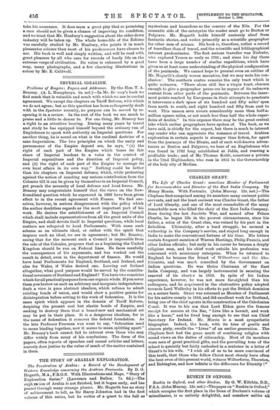CHARLES GRANT.
The Life of Charles Grant : sometime Member of Parliament for Inverness-shire and Director of the East India Company. By Henry Morris. With Portraits. (John Murray. 12s. net.)—The Clapham Sect comprised among its members many eminent public servants, and not the least eminent was Charles Grant, the father of Lord Glenelg, and one of the most remarkable of the many remarkable men who filled the chair of the East India Company. Born during the last Jacobite War, and named after Prince Charlie, he began life in the poorest circumstances, since his father, a scion of the Grant clan, was ruined by his part in the Rebellion. Ultimately, after a hard struggle, he secured a writership in the Company's service, and stayed long enough in India to make the conventional fortune of his time. His letters contain frequent mention of Warren Hastings, Philip Francis, and other Indian officials; but early in his career he became a deeply religious man, and his chief work outside his profession was concerned with missionary enterprise. When he returned to England he became the friend of Wilberforce and the Abo- litionists, and was much consulted by the Government on Indian questions. He was thrice Chairman of the East India Company, and was largely instrumental in securing the renewal of its chartEr in 1813. In spite of his Indian experience, however, he was not more far-sighted than his colleagues, and he acquiesced in the obstructive policy adopted towards Lord Wellesley in his efforts to put the British dominion on a secure basis. Grant was returned as Member of Parliament for his native county in 1818, and did excellent work for Scotland, being one of the chief agents in the construction of the Caledonian Umal. It was to his son that Lord Eldon gave the famous receipt for success at the Bar, "Live like a hermit, and work like a horse," and he lived long enough to see that son Chief Secretary for Ireland. Mr. Morris is a most sympathetic biographer. Indeed, the book, with its tone of gentle and sincere piety, recalls the "Lives" of an earlier generation. The Clapham Sect had the great merit of combining religion with sound views on the duties of citizenship. Most of its members were men of great practical gifts, and the prevailing tone of the school is quaintly but fairly embodied in a sentence in a letter of Grant's to his wife. "I wish all of us to be more convinced of this truth, that those who follow Christ most closely have often the best even of this present world, witness Wilberforce, Thornton, and Babington, and how infinite is the difference for Eternity !"






















































 Previous page
Previous page